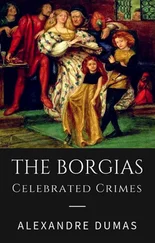Isabella d’Este and Elisabetta Gonzaga were less enthusiastic about their new sister-in-law. No longer in their prime, the Duchess of Urbino was thirty and Isabella just three years younger, while Lucrezia, despite her three husbands, was still only twenty-one years old. The two older women were clearly put out by the bride, who was undeniably younger and prettier than themselves and, moreover, took precedence over them at court.
The malicious Isabella did her utmost to make the unwelcome bride uncomfortable; ‘yesterday,’ she wrote grumpily to her husband in Mantua, ‘we all had to stay in our rooms until five o’clock because Lucrezia chooses to spend hours dressing so that she can put the Duchess of Urbino and myself into the shade in the eyes of the world.’ The Borgia girl, she complained, spent an unconscionable time dressing, washing her hair, and chattering in her rooms; she also declined to attend such festivities as did not appeal to her; and when a risqué comedy was performed, she was obviously amused by it, while Isabella made it clear that she, like all respectable ladies, found it most objectionable.
With the departure of the guests on February 9, Ash Wednesday and the beginning of Lent, Lucrezia settled down to life at court as wife to Alfonso, the duke’s heir. On Maundy Thursday she acted as hostess for her father-in-law at the customary dinner given to 160 poor people, serving their food and assisting in the washing of their feet. The next day, Good Friday, she attended Mass in the cathedral, where the congregation was entertained by a Passion play, a five-hour spectacle with angels descending from the roof to hover over Christ as he prayed in the garden of Gethsemane, his Crucifixion on a hill specially built in front of the high altar and his Descent into Hell through the head of a huge writhing serpent.
Yet as the days passed, she found life in Ferrara hard, homesick for Rome and her beloved father. She spent mornings in bed; she lay in the scented waters of her bath, accompanied by one of her young ladies, who, when they emerged, would read erotic novels to her. She passed increasingly long periods in the rooms that had been assigned to her with her Spanish attendants to whom she spoke in their own Valencian dialect and with whom the Ferrarese ladies were soon on the worst of terms. She even offended her conservative father-in-law, as she did many other Ferrarese, by introducing at court a Spanish costume, zaraguelles , wide, pleated pantaloons of silk or muslin worn under the skirt.
Duke Ercole, despite his affection for Lucrezia, was growing anxious about the cost of all the entertaining that he was expected to provide. Most of the marriage guests had departed; but several members of Lucrezia’s court remained, and ‘these women,’ her father-in-law complained, ‘by remaining here cause a large number of other persons, men as well as women, to linger on… [I]t is a great burden and causes heavy expense. The retinue of these ladies… numbers not far short of 450 persons and 350 horses.’ He also worried about the cost of maintaining Lucrezia’s large and mostly Spanish household, declaring that the number of his daughter-in-law’s ladies and servants must be reduced; and, despite her protests, he dismissed from her court all whom he considered unnecessary.
To the evident surprise of her critics, she accepted her father-in-law’s decision with good grace; and not only this, she set about conciliating the most critical of the Ferrarese ladies. Among them was a friend of Isabella d’Este, Teodora Angelini, who was frequently invited to dine at Lucrezia’s table, an enticing privilege, especially during Lent, when the duke’s table became excessively monotonous, while Lucrezia’s was plentifully supplied with a variety of dishes from oysters and scampi to sturgeon, crayfish, and caviar.
The extravagance of the meals served at Lucrezia’s table naturally horrified the duke. He consulted his daughter, Isabella, who declared that Lucrezia’s needs could easily be met by an allowance of 8,000 ducats a year rather than the 12,000 ducats that the pope was demanding for her. The duke offered to compromise by allowing her 10,000 ducats; this the pope refused; and Lucrezia, anxious to escape the acrimonious gossip that this quarrel was causing at court and, suffering the symptoms that told her she was now bearing Alfonso’s child, retreated to the convent of Corpus Domini.
The news that Lucrezia was pregnant, so soon after the marriage, delighted the duke and also the pope. ‘His Holiness has taken on a new lease of life in consequence of the news from Ferrara,’ wrote Burchard, ‘and every night he is commanding into his presence young women chosen from the best Roman brothels.’ As though in celebration of Lucrezia’s pregnancy, he also sent for Jofrè, Jofrè’s wife, Sancia, and even for Sancia’s lover, Prospero Colonna; one particularly lurid account suggests that the pope then left the two men in an antechamber while he took Sancia off to one of the private rooms from which he returned after a while to tell Jofrè and Colonna that she was ‘still worth the serious attention of a young man.’
The pope’s cheerful mood in hopes of a grandchild, however, were soon to end in disappointment and worry. In May Alfonso had left Ferrara on business, and Lucrezia had taken advantage of his absence to go to Belriguardo, one of the duke’s many villas in the countryside and where, she hoped, the fresh air and beautiful surroundings would improve her health. She had felt much better on her return to Ferrara, but the sultry summer heat in the city soon caused a relapse. By the middle of that hot July of 1502, she fell dangerously ill. Her husband was sent for; so were several doctors in addition to Francesco Castello, the court physician. The pope, gravely concerned, maintained that the illness had been caused by his daughter’s distress at being kept so short of money.
Meanwhile, the patient grew worse, suffering from paroxysms and fits of delirium. It was supposed, inevitably, that she had been poisoned; but it was soon clear that a virulent outbreak of the flux had gripped the entire court. Her condition grew worse, and it was widely feared she would die; her husband and her beloved brother hastened to her bedside and, miraculously, found her better, sitting up in bed. Days later she suffered another relapse; all August she lay close to death until finally, on September 5, she gave birth to a stillborn daughter.
Cesare arrived in Ferrara two days later to find her ill with puerperal fever and refusing to allow her doctors to bleed her. Cesare’s company seemed to rally her, and he induced her to give way to the doctors’ advice. ‘We bled Madonna on the right foot,’ one of the doctors reported. ‘It was extremely difficult to do, and we could not have done it had it not been for [Cesare] who held her foot, and made her laugh and cheered her greatly.’
Lucrezia recovered slowly from her ordeal, and when she was well enough to travel, she was carried in a litter to the care of the sisters of the convent of Corpus Domini. She was accompanied by her contrite husband, who, although he had made a vow to make a pilgrimage to the shrine of the Virgin at Loreto, a place much venerated by those who experienced problems with conception and pregnancy, intending to walk the 170 miles on foot should God spare her life, he contented himself with travelling there by boat and then making one of those inspections of military establishments that he undertook so often.
— CHAPTER 22 — Castles and Condottieri
‘THE AMOUNT OF A POPE’S INCOME IS WHATEVER HE CHOOSES IT TO BE’
IN MARCH 1502, while Lucrezia was adjusting to life at the ducal court in Ferrara, an event occurred that demonstrated just how strong and resourceful both the pope and Cesare could be in moments of crisis. The two men — accompanied by six cardinals, one of whom was Lucrezia’s brother-in-law Ippolito d’Este, seven prelates, and a large number of courtiers, secretaries, and servants — had travelled by boat to Piombino, where they had reviewed the defences of this strategic port captured by Cesare’s troops the summer before. ‘Six triremes had been prepared,’ recorded Burchard, ‘using those prisoners incarcerated for petty crimes to man the oars’; others had been press-ganged ‘by violence or by trickery in the taverns of Rome,’ and the pope had also ‘requisitioned all barge owners and many fishermen.’
Читать дальше











